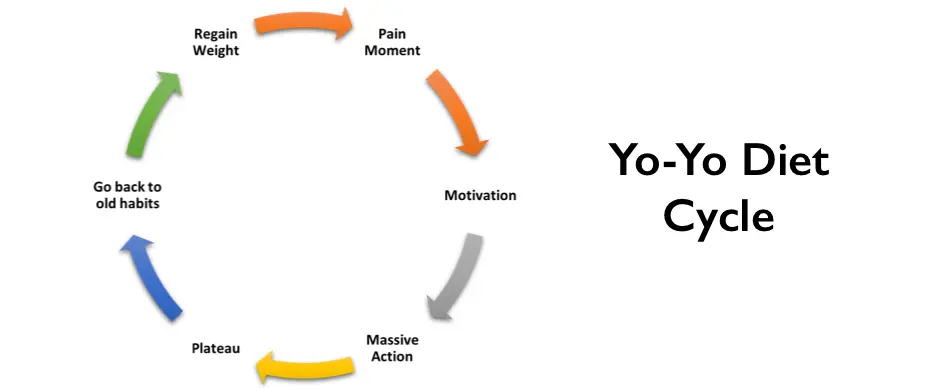Many people trying to lose weight often get caught in the cycle of yo-yo dieting—rapidly shedding pounds through strict diets, only to gain them back just as fast. This pattern can be frustrating and harmful, making it harder to reach lasting results. It not only affects physical health by straining the body but also takes a toll on mental well-being, leading to feelings of failure and low self-esteem. Over time, this cycle can make it even harder to maintain a healthy weight.
Breaking free from yo-yo dieting means adopting a more sustainable and balanced approach. Instead of relying on quick fixes, focusing on long-term habits that are backed by science can lead to better results. In this guide, we will look closely at why yo-yo dieting is so damaging, how it affects the body and mind, and what proven strategies can help you achieve healthy, lasting weight loss. The goal is to build a strong foundation for lifelong wellness and confidence.
Understanding Yo-Yo Dieting

Yo-yo dieting, often called weight cycling, happens when a person goes through repeated phases of losing and regaining weight. Usually, it starts with strict dieting to quickly lose pounds, followed by a return to old eating habits that cause the weight to come back. Over time, this cycle tends to repeat, leading to continuous changes in body weight.
At first, the weight loss might feel exciting and motivating, giving a sense of achievement. However, when the weight eventually returns, it can leave a person feeling frustrated and disappointed. This emotional rollercoaster can lower self-esteem and make it harder to stay committed to long-term health goals.
Additionally, each cycle of losing and gaining weight can make the body more resistant to future efforts. The body may adjust to these changes by slowing metabolism or holding onto fat more stubbornly. This makes it more difficult to achieve weight loss over time and highlights the importance of adopting healthy, steady habits rather than quick fixes.
The Hidden Dangers of Yo-Yo Dieting
Engaging in yo-yo dieting can have several adverse effects on the body:
1. Increased Body Fat Percentage
When people lose weight through very strict diets, they usually lose both fat and muscle. However, when they regain the weight, the body tends to rebuild fat more easily than muscle. Over time, this can cause the body fat percentage to rise, even if the overall weight looks about the same. This change can make the body less healthy and harder to manage, highlighting the risks of quick weight loss methods and the importance of maintaining muscle during weight loss.
2. Slowed Metabolism
Going through repeated cycles of losing and gaining weight can upset the body’s natural metabolic processes. In response, the body may slow down its metabolism to conserve energy, which makes it harder to lose weight in the future. This slowdown means the body burns fewer calories even when at rest. This process is often known as “adaptive thermogenesis” and can create challenges for people trying to achieve long-term weight loss goals, making steady and healthy habits even more important.
3. Higher Risk of Chronic Diseases

Yo-yo dieting has been associated with an increased risk of several chronic conditions, including:
Type 2 Diabetes: Frequent changes in weight can harm how the body handles insulin, a hormone that controls blood sugar levels. When insulin sensitivity decreases, it becomes harder for the body to manage blood sugar properly, raising the risk of developing type 2 diabetes over time. This risk grows with each cycle of weight loss and regain.
Heart Disease: Weight cycling can cause fat to build up around important organs, especially in the belly area, known as visceral fat. This type of fat is linked to a higher chance of heart problems, such as high blood pressure, blocked arteries, and other cardiovascular diseases. Each cycle can add more stress to the heart.
Fatty Liver Disease: Repeatedly gaining weight can cause extra fat to collect in the liver. Over time, this build up can harm liver function and lead to fatty liver disease. If left unmanaged, fatty liver disease can cause serious health problems, including liver inflammation and damage.
4. Mental and Emotional Strain
Constantly losing and regaining weight can take a heavy toll on a person’s emotions. After putting in hard work to lose weight, gaining it back can cause strong feelings of frustration, disappointment, and guilt. Over time, these emotions can lower self-esteem and make people feel like they have failed. This emotional strain often leads to unhealthy eating habits, such as emotional eating or giving up on healthy routines altogether. As a result, it becomes even harder to achieve long-term weight loss success.
Breaking the Cycle: Sustainable Weight Loss Strategies
To achieve lasting weight loss and maintain a healthy weight, consider adopting the following evidence-based strategies:
1. Embrace a Balanced Diet
Instead of following fad diets or cutting too many calories, focus on eating a balanced diet. Include plenty of fruits, vegetables, lean proteins, whole grains, and healthy fats. Eating a variety of nutrient-rich foods helps your body stay strong and keeps you feeling full, making it easier to maintain a healthy weight without extreme restrictions.

Fruits and Vegetables: Rich in vitamins, minerals, and fiber.
Lean Proteins: Such as chicken, fish, legumes, and tofu.
Whole Grains: Like brown rice, quinoa, and whole wheat.
Healthy Fats: Found in avocados, nuts, seeds, and olive oil.
2. Prioritize Physical Activity
Regular exercise is essential not only for effective weight management but also for improving overall health. It helps boost metabolism, burn calories, and build muscle, all of which contribute to maintaining a healthy weight. Additionally, regular physical activity improves heart health, strengthens bones, and enhances mood, making it a key part of a balanced lifestyle. Consistent exercise also supports better sleep and boosts energy levels.
Cardiovascular Exercise: Activities like walking, jogging, cycling, or swimming.
Strength Training: Building muscle mass can boost metabolism and support fat loss.
Flexibility and Balance Exercises: Yoga or Pilates can improve overall fitness and reduce stress.
3. Practice Mindful Eating
Mindful eating is the practice of focusing fully on the experience of eating and drinking, without distractions. It encourages you to savor each bite, paying attention to taste, texture, and the sensations of hunger and fullness. By being more aware of these signals, you can avoid overeating and make healthier food choices. This practice not only helps in managing portion sizes but also promotes a more positive and balanced relationship with food, reducing emotional eating and fostering better long-term habits.
4. Set Realistic Goals
Set realistic and sustainable goals for yourself. Instead of aiming for rapid weight loss, aim for a gradual and steady loss of about 0.5 to 1 kg per week. This approach helps prevent burnout and allows your body to adjust over time. Breaking your larger goals into smaller, achievable steps can help you stay motivated and on track. Celebrating these small wins along the way keeps you encouraged and focused, leading to long-term success and a healthier lifestyle.
5. Seek Professional Guidance
Consulting with healthcare professionals like dietitians, nutritionists, or therapists is a great way to receive personalized guidance and support. These experts can assess your unique health needs and help create a customized plan that fits your lifestyle, preferences, and goals. Whether it’s designing a balanced eating plan or addressing emotional eating habits, their advice can help you make informed decisions. Working with professionals ensures you have a sustainable approach that works specifically for you, increasing your chances of long-term success.
The Role of Support Systems
One of the most underestimated yet powerful tools in successful, long-term weight loss is a strong support system. Weight loss isn’t just about calories and cardio—it’s also about mindset, motivation, and consistency. Having people around you who understand your goals, encourage your progress, and hold you accountable can make all the difference between temporary changes and lasting transformation.
Let’s explore how support systems contribute to breaking the yo-yo dieting cycle and help you lose weight the right way.
1. Emotional Support During Setbacks
Everyone faces obstacles—missed workouts, slip-ups with food, plateaus in progress. During these moments, it’s easy to feel discouraged or fall back into old habits. Supportive friends, family, or community members can offer encouragement when you’re feeling low. They can remind you of how far you’ve come, help you reframe setbacks, and keep you from giving up.
Emotional support isn’t just about cheering you on; it’s about being heard, feeling understood, and having someone to turn to when the journey gets tough.

2. Accountability Increases Consistency
Having a support system can significantly boost your motivation and accountability. Whether it’s a workout buddy, a dietitian, or an online group, knowing others are involved in your journey helps you stay on track. These connections provide encouragement during challenges and celebrate progress together. When you share your experiences and goals with others, it reinforces your commitment and makes it easier to stay focused on your health objectives. The support system acts as a reminder to stay consistent and can offer advice, guidance, and positivity when you need it most. This shared experience makes you more likely to stick to your goals and ultimately achieve lasting success.
Accountability helps by:
Encouraging regular check-ins
Creating shared goals or challenges
Reminding you of the bigger picture on hard days
Even something as simple as texting a friend after your workout can reinforce positive habits.
3. Sharing Ideas and Resources
Weight loss doesn’t have to be a solo journey. Being part of a supportive network offers access to a wealth of knowledge, ideas, and practical tips from others who are on the same path. Support group members often share helpful resources like healthy recipes, effective workout routines, and mindset strategies that have worked for them. These exchanges can keep your weight loss journey fresh, engaging, and sustainable by offering new perspectives and solutions.
Sometimes, simply hearing how someone else overcame a challenge you’re currently facing can spark the inspiration and motivation you need to keep moving forward. A shared experience can remind you that you’re not alone and that setbacks are a normal part of the process, making it easier to stay focused and committed.
4. Motivation Through Shared Experiences
There is a tremendous power in shared experiences. Watching others work toward their goals, face struggles, and ultimately succeed can provide the inspiration you need to stay committed to your own journey. Support groups create a sense of positive peer pressure, where you witness what is possible and feel motivated to push yourself toward similar success.
Being part of this community offers more than just advice—it fosters a sense of belonging and shared purpose. This connection helps reduce feelings of isolation, making the journey feel less daunting and more manageable. The encouragement and collective determination within the group can turn challenges into opportunities, making it easier to stay on track and continue moving forward.
5. Celebrating Milestones Together
Success feels even sweeter when it’s shared. Whether you celebrate your first 5-pound loss, complete your first 5K, or cook your first healthy meal, sharing those victories with others reinforces your progress and helps build momentum. A supportive network cheers you on during these moments, making each milestone feel significant and worthwhile.
These moments of joy and recognition provide emotional fuel for your journey, reminding you that every small step forward is worth celebrating. Having others around to acknowledge your achievements keeps you motivated, boosts your confidence, and strengthens your commitment to long-term success.
6. Encouraging a Positive Self-Image
Yo-yo dieting doesn’t just affect the body; it can take a toll on the mind as well. It often leaves you feeling like a failure or disconnected from your sense of self-worth. A strong support system can help rebuild your confidence by reminding you of your inner strength, value, and potential.
People who are supportive don’t focus on judging your progress—they celebrate your efforts. They help you shift your focus from how far you still have to go to how much you’ve already achieved, encouraging you to appreciate each step forward. This positive reinforcement boosts your self-esteem and motivates you to keep moving forward on your journey.
Types of Support Systems You Can Tap Into
Friends & Family: Talk openly with loved ones about your goals and ask for their encouragement.
Fitness Communities: Local gyms, walking clubs, or online groups can provide social accountability.
Support Groups: Both online and in-person groups like Weight Watchers or Facebook communities create space for shared experience and motivation.
Health Professionals: Registered dietitians, personal trainers, or therapists can offer structured, informed support.
Apps & Technology: Tools like MyFitnessPal, Fitbit, or Noom include community elements that provide support at your fingertips.
Conclusion
Breaking free from the yo-yo dieting cycle requires making long-term lifestyle changes rather than quick fixes. This means focusing on balanced nutrition, incorporating regular physical activity, and adopting mindful eating habits. These changes help create a sustainable approach to weight management and overall well-being.
Setting realistic goals is essential for long-term success. Aim for gradual progress instead of rapid weight loss. Achieving small milestones along the way keeps you motivated and ensures you’re taking a healthier approach to weight management.
Remember, the journey to better health is a marathon, not a sprint. Be patient with yourself and embrace the process. Celebrate each achievement, no matter how small, as it brings you closer to your ultimate health goals. With consistent effort and a positive mindset, you can achieve lasting weight loss and improved health.
FAQs
1. What is yo-yo dieting ?
Yo-yo dieting, or weight cycling, refers to the repetitive cycle of losing weight through restrictive diets and then regaining it once normal eating habits resume.
2. How does yo-yo dieting affect my health ?
Yo-yo dieting can lead to increased body fat percentage, a slower metabolism, higher risk of chronic diseases like type 2 diabetes and heart disease, and mental and emotional stress.
3. Why do I regain weight after dieting ?
When you lose weight rapidly, you often lose both fat and muscle. After the diet ends, your body tends to restore fat more quickly than muscle, leading to weight regain.
4. How can I break the cycle of yo-yo dieting ?
Focus on sustainable weight loss strategies like eating a balanced diet, exercising regularly, setting realistic goals, and practicing mindful eating.
5. What’s a realistic weight loss goal ?
Aim for a gradual weight loss of 0.5 to 1 kg (1-2 lbs) per week. Slow, steady progress is more sustainable and healthier than rapid weight loss.
6. Can exercise help me prevent weight regain ?
Yes, regular physical activity, especially strength training, helps build muscle and boost metabolism, which can prevent weight regain and support long-term weight management.
7. Should I consult a professional for weight loss ?
Yes, seeking guidance from healthcare professionals like dietitians, nutritionists, or therapists can provide personalized advice and support tailored to your specific needs.
8. How can I deal with emotional struggles during my weight loss journey ?
Consider practicing mindful eating, building a support system, and setting small, achievable goals. Working with a therapist or counselor can also help manage emotional challenges.
9. Is there a “one-size-fits-all” approach to weight loss ?
No, weight loss is highly individual. Factors like genetics, lifestyle, and personal preferences matter, so it’s important to tailor your approach to your unique needs and circumstances.
10. How long will it take to see results ?
Sustainable weight loss takes time. Be patient, as lasting changes to your body and health are gradual. Celebrate small milestones along the way!

